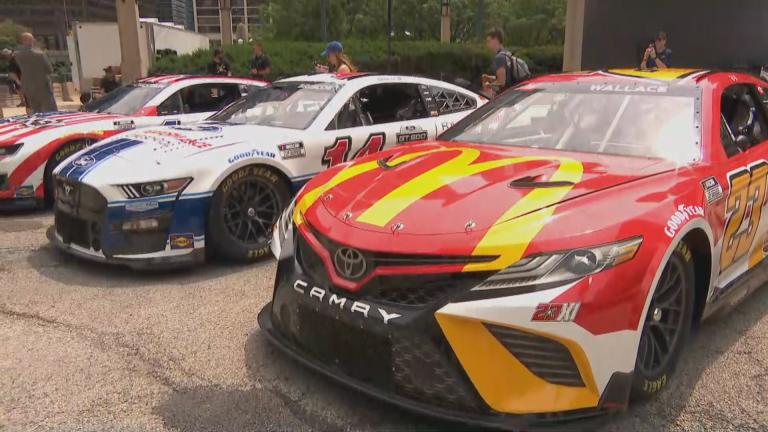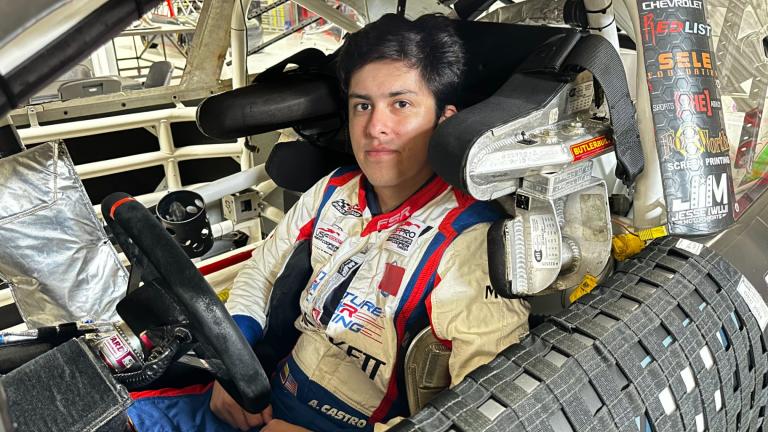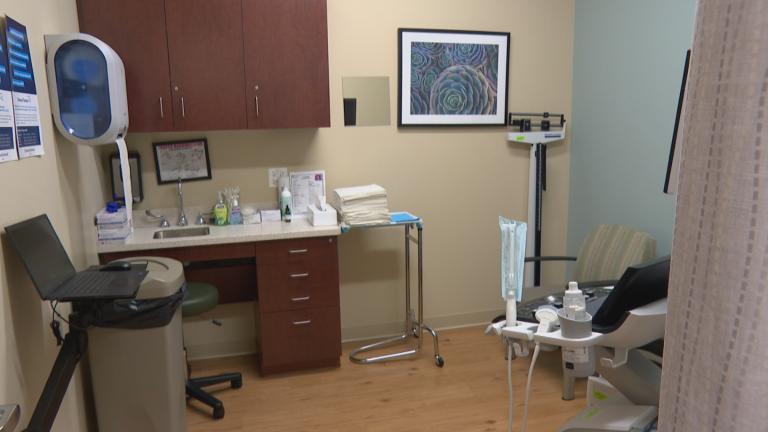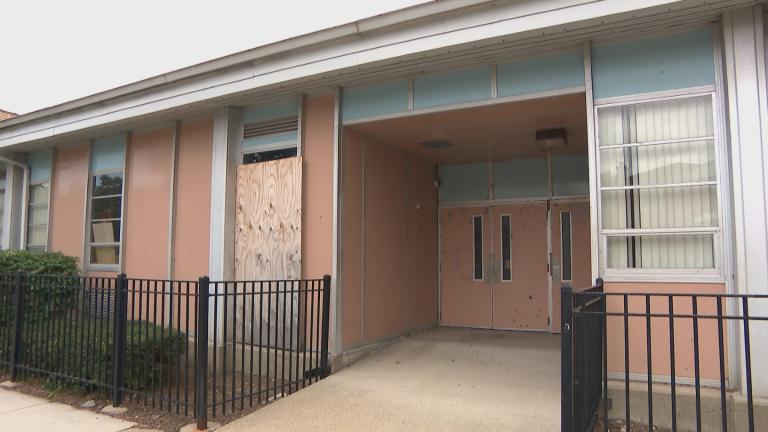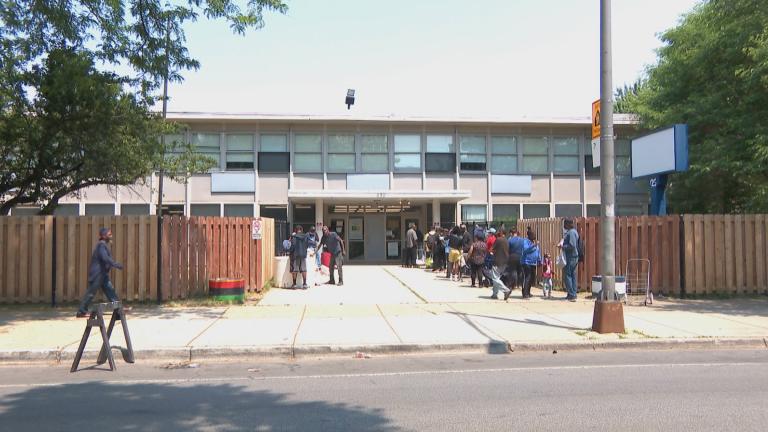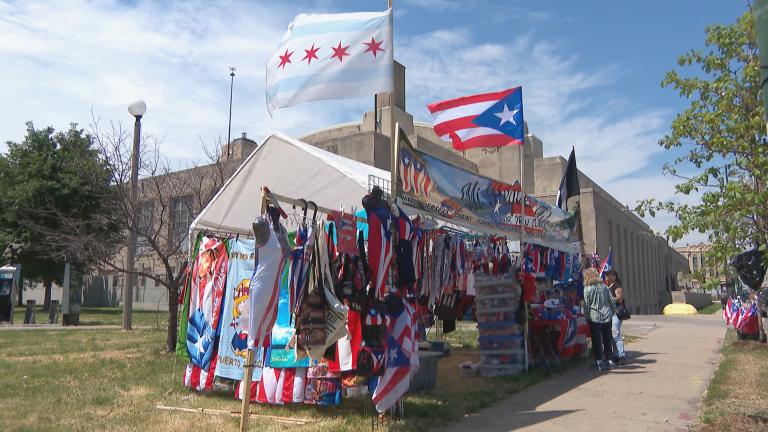Pilsen has long been an enclave for immigrants, drawing people from Ireland, Poland, Czechoslovakia, and, since the ‘60s, a largely Mexican population.
Today, the community has many residents who are struggling because of the coronavirus, said Moises Moreno, director of The Pilsen Alliance. On 18th Street, which stretches across Pilsen, the alliance has served as a hub, he said, coordinating financial assistance and weekly food distribution.
Now, the Pilsen Alliance is fundraising to help those in need pay their utility bills.
“There’s not enough resources. These resources don’t work. There’s not enough,” Moreno said.
The ZIP code 60608, which includes most of Pilsen, has a 13.7% positivity rate as of Dec. 5, according to city data.
Latino communities in Chicago, and across the country, have been disproportionately impacted by COVID-19. As vaccines become available, Ald. Byron Sigcho-Lopez, whose 25th Ward includes Pilsen, hopes the city has learned from its response in terms of testing and tracing.
“We’ll continue working with public health officials to ensure that essential workers are prioritized,” Sigcho-Lopez said. “We continue to have issues with testing. We continue to have issues with tracing. It’s not adequate or enough, but I think we as a community are coming together to demand a better response.”
But he feels optimistic that people are coming together.
Video: Watch our full interview with Ald. Byron Sigcho-Lopez.
However, regulation aimed at curbing the spread of the virus makes it difficult for the area’s small businesses to thrive, said Alex Esparza, executive director of Economic Strategies Development Corporation.
“At the beginning of this pandemic it was supposed to be a 15-day break for the small businesses ... you go home as a small business, in two weeks we’re gonna come back,” said Esparza. “But little did we know, it’s December and again, numbers have risen up.”
It's one of many battles Pilsen is fighting.
Advocates like Veronica Reyes of The Resurrection Project are also working to secure affordable housing for residents who’ve called Pilsen home for generations but are now struggling to keep up as rents rise in the popular neighborhood.
The community has seen a lot of economic development and has many attractions, she said.
“It becomes a much more attractive neighborhood for families to come and live here, which is great, however, it becomes a challenge when you start raising rents, and families that have lived here for years can no longer stay here,” Reyes said.
Photojournalist and creative Mateo Zapata said this year he’s seen the community step up. Instead of waiting for a government rescue, they’ve come together to help one another.
Zapata said he produced public service announcements in English and in Spanish to inform residents about the dangers of the coronavirus because he felt like nobody else was doing enough to warn them.
“All my friends are essential workers, so I wanted that to be documented,” Zapata said. “The reality to be documented, and living through the intersection of a pandemic and the fight for social justice, makes us confront the question that if our labor is seen as essential, and our workforce is deemed essential, then our rights to having resources and equality needs to be essential too. The right to safety in our communities needs to be considered essential.”
Zapata also captured some of the protests across Chicago this summer, particularly the unity rallies that unfolded in Chicago’s Latino neighborhoods on the South Side after racial tensions increased, including one rally in Pilsen in June.
“The motivation behind that was just to make sure that the history that was taking place, and all the Black and Brown unity rallies, and the solidarity for the Black Lives Matter movement on behalf of Latinos in Chicago needed to be documented,” he said. “I didn’t want that to be something that would be forgotten or not recorded in some way because that tends to happen with movements in our neighborhoods.”
Moreno said The Pilsen Alliance was also involved in conversations within the community.
“The first thing is to be honest, to be truthful of the situation,” Moreno said. “There was, has been racial tensions, and again it was the moment that it just sparked. It wasn’t something that just happened overnight. It’s due to a lot of things. Racial segregation is a big factor.”
There are signs posted in the windows of many stores in Pilsen that read phrases like: “Black Love” and “Brown Pride.”
Escaramuza, a shop along 18th Street, has been around for 25 years. It sells traditional arts and crafts imported from 10 states in Mexico, said Julio Velazquez.
He said each time the city or state announces new COVID-19 regulations, business slows for a week or so. Then it crawls back.
“We’re kind of scared because we cannot predict what’s gonna happen,” Velazquez said. “We used to have kind of a sense of what’s gonna happen in the following two, three months, but right now we’re in a position where we can’t predict what’s going to happen next month. What if the city announces something new? What if the governor announces something new that is gonna scare people?”
Meanwhile, food insecurity has increased in Pilsen and the surrounding communities. The Pilsen Food Pantry has served more people in 2020 than in 2018 and 2019 combined, and they don’t have enough food to serve everyone in need, said Dr. Evelyn Figueroa, director of the pantry.
“Our numbers went up 50% with the pandemic,” said Figueroa, which is similar to numbers seen across the country. “We take care of over 1,000 families every month.”
After moving to a new location in March, the Pilsen Food Pantry opened its Clothes Closet. It’s taking donations through Dec. 17, including for its toy drive, clothes closet and food pantry.
Video: Our full interview with Evelyn Figueroa, director of the Pilsen Food Pantry.
“Chicago Tonight” is expanding its community reporting. We’re hitting the streets to speak with your neighbors, local businesses, agencies and leaders about COVID-19, the economy, racial justice, education and more. See where we’ve been and what we’ve learned by using the map below. Or select a community using the drop-down menu. Points in red represent our series COVID-19 Across Chicago; blue marks our series “Chicago Tonight” in Your Neighborhood.Community Reporting Series

